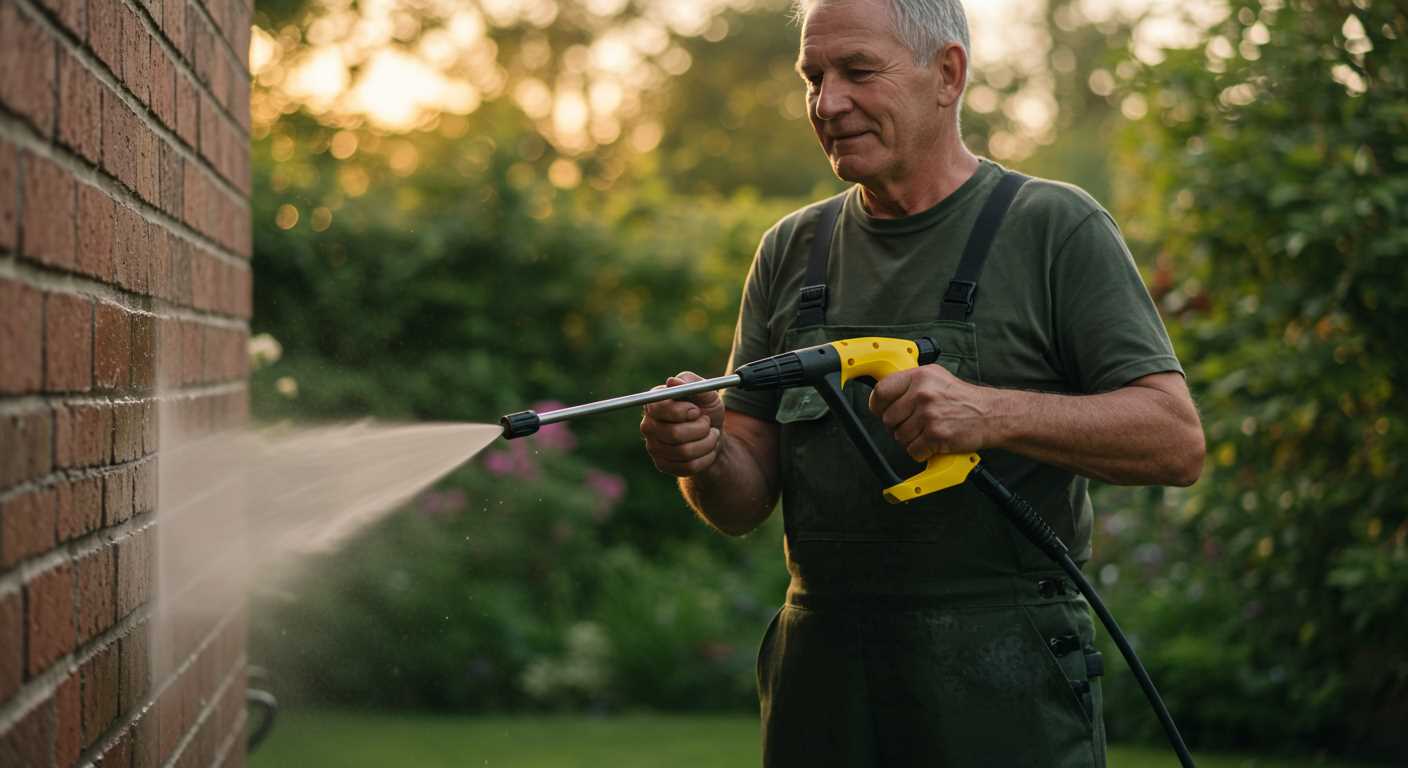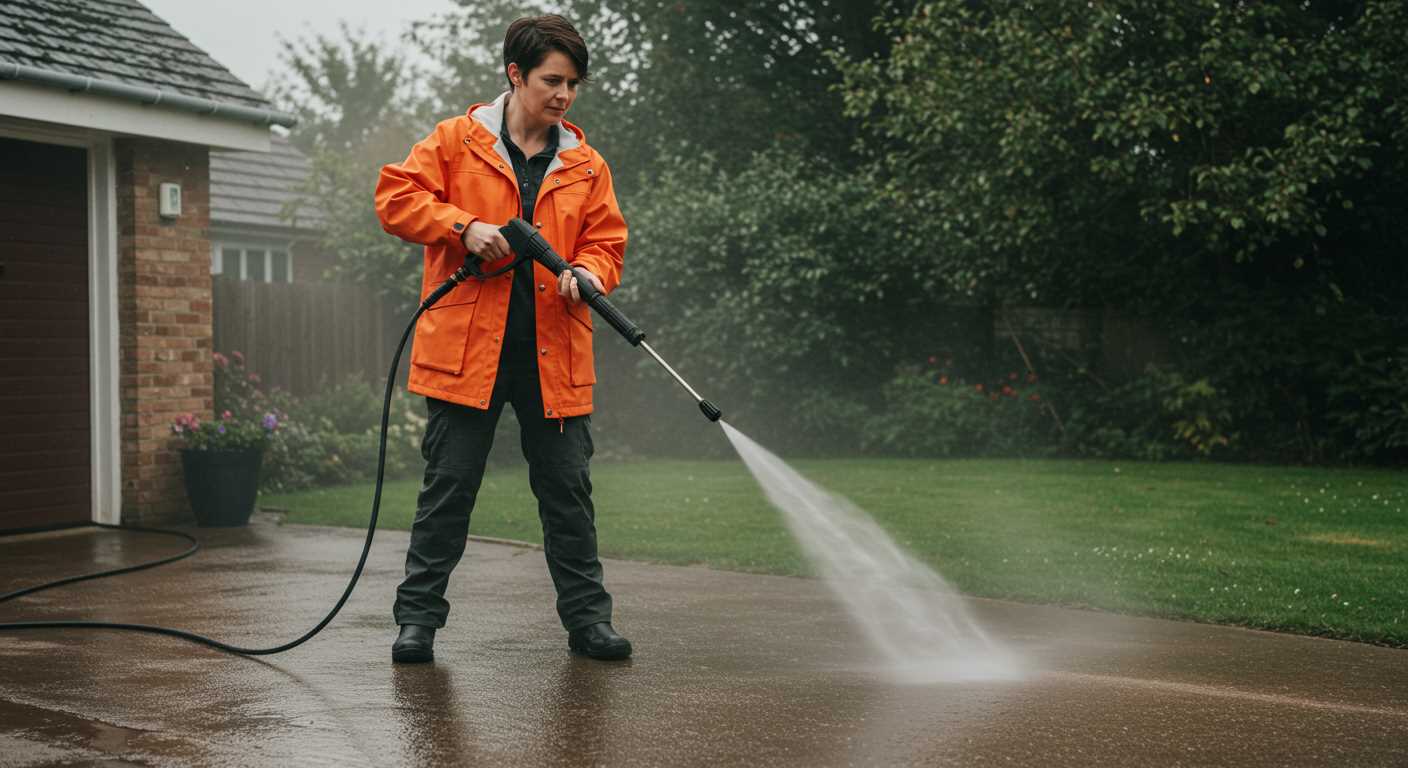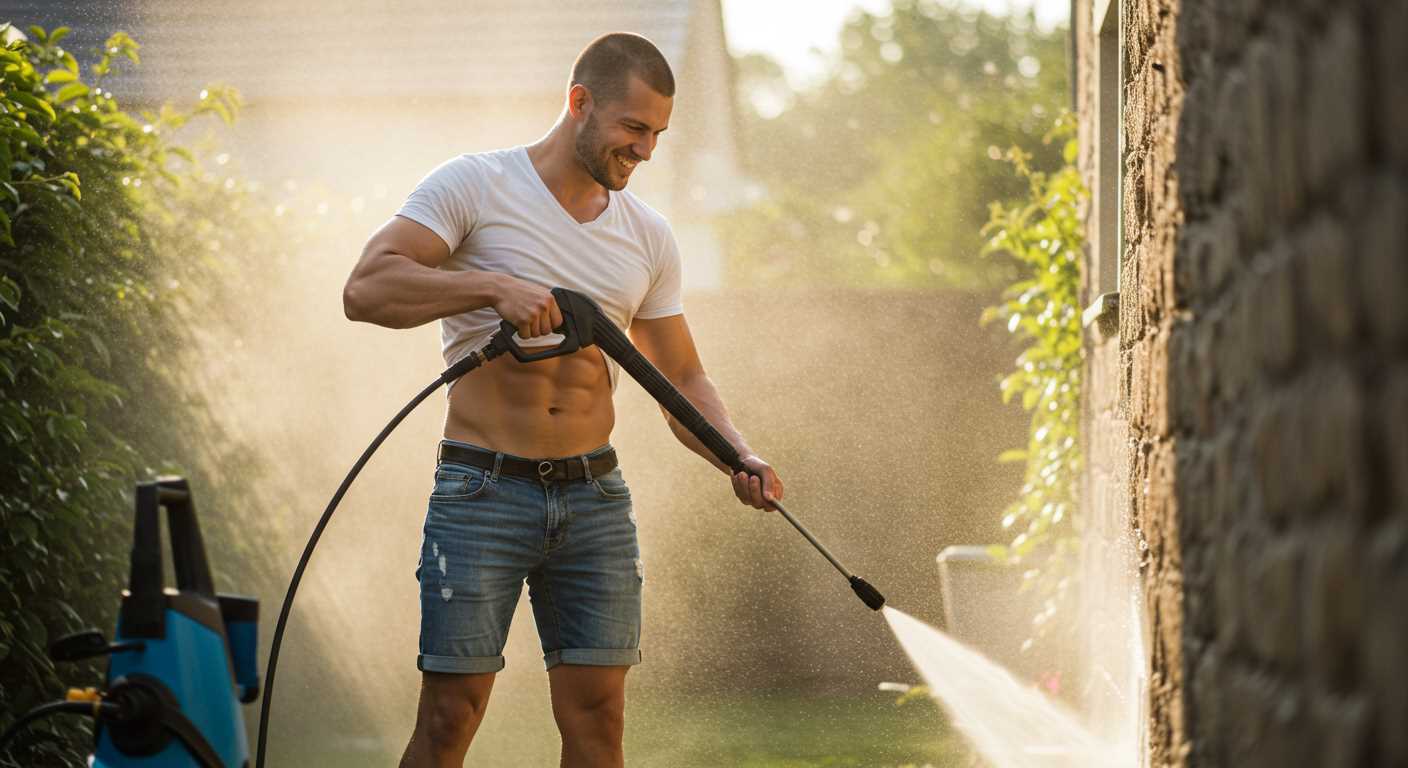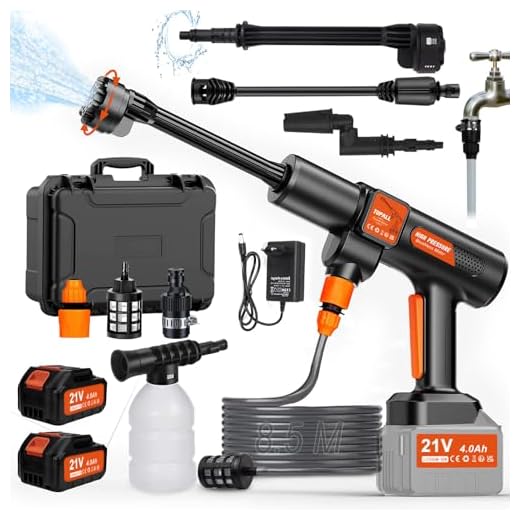



Prioritise flow rate and pressure ratings. A unit delivering at least 400 litres per hour with a pressure between 130 and 160 bar suits most home cleaning tasks effectively.
Durability comes with material selection. Opt for models featuring brass or stainless-steel components over plastic, ensuring longevity and reliability under pressure. Look for high-quality hoses that can withstand abrasion and are less prone to kinking.
Consider power sources based on your needs. Electric units offer convenience for smaller jobs, while petrol options provide mobility and higher performance for extensive outdoor areas. Ensure the chosen machine aligns with the types of tasks you’ll undertake.
Evaluate nozzle versatility. Interchangeable nozzles enhance functionality, giving you the ability to switch from wide spray patterns for rinsing to focused jets for stubborn stains. This adaptability can save both time and effort.
Finally, think about weight and portability. Choose a model that’s manageable, especially if you’ll be moving it between locations. A well-designed unit with sturdy wheels makes handling much easier, especially on uneven surfaces.
What to Consider in a High-Performance Cleaner

Choose a unit with an adequate PSI (pounds per square inch) rating. For light tasks like cleaning patios or garden furniture, 1300-1900 PSI suffices. For tougher jobs such as stripping paint or cleaning vehicles, aim for 2000-2800 PSI.
GPM (gallons per minute) is equally critical. A higher GPM means quicker cleaning tasks since it delivers more water to the surface. For residential uses, opt for 1.5-2.5 GPM. Combining PSI and GPM will provide a better understanding of the cleaner’s efficiency.
Motor type influences durability and performance. Electric models are quieter and lighter, suitable for minor chores. If you require mobility and power, a gas-powered variant is superior, providing high PSI and GPM for demanding tasks.
Examine the spray nozzle options. A unit with interchangeable nozzles or adjustable wands offers versatility. Nozzles usually vary from 0 to 40 degrees, with lower degrees focusing power for tough stains and wider angles suitable for larger surfaces.
Consider the build quality. A robust frame made from metal rather than plastic ensures longevity. Lightweight designs with wheels simplify transport, especially for larger models.
Accessories enhance functionality. Look for items like surface cleaners for large areas, detergent injectors for improved cleaning, and extension wands for hard-to-reach spots. These extras can significantly boost the machine’s capability.
Check for maintenance features, such as easy access to the motor and pump. A model that facilitates quick cleaning of filters and hose connections will save time and retain performance. Always review warranty details too; reputable brands usually offer extensive coverage on both the unit and parts.
Understanding the Different Types of Cleaning Equipment
When selecting this kind of machinery, it’s crucial to grasp the various models available, as each serves specific tasks effectively. There are three primary categories: electric units, gas-powered machines, and commercial-grade models.
Electric Units
Electric devices are perfect for light-duty applications, such as washing cars, patios, or outdoor furniture. They generally require a standard electrical outlet, offering convenience and ease of use. Pressure output typically ranges from 1300 to 2000 PSI, making them suitable for smaller cleaning tasks. Consider choosing a model with a long power cord and a stable design for versatility and efficacy.
Gas-Powered Machines
For heavier jobs, gas-driven machines provide higher pressure levels, often between 2500 and 4000 PSI. They are ideal for tackling tough stains, cleaning larger surfaces like driveways or decks, and handling professional-grade tasks. Look for features like an easy-start mechanism and sturdy wheels for manoeuvrability. While these models require more maintenance, their power and portability make them a solid choice for demanding applications.
Understanding these categories equips you better for making informed choices tailored to your specific cleaning needs. Each type has its strengths and challenges, so weigh your requirements carefully before making a decision.
Evaluating Pressure Washer PSI Ratings
When assessing cleaning equipment, ratings in PSI (pounds per square inch) are critical. Higher PSI translates to more powerful removal of dirt and grime. It’s essential to match the strength of the device to the specific task at hand.
- General cleaning tasks, such as washing vehicles or patios, benefit from machines delivering 1300-1900 PSI.
- For tougher stains on concrete or brick surfaces, a range of 2000-2800 PSI is advantageous.
- Heavy-duty jobs may require units with 2900 PSI and above, suitable for stripping paint or deep cleaning industrial equipment.
It’s not just about maximum PSI; flow rate, measured in gallons per minute (GPM), is also vital. A higher GPM indicates more water is being delivered, enhancing the cleaning process. Optimal cleaning power comes from a balance where both PSI and GPM are considered together. Aim for a device with at least 2 GPM for effective results at higher PSI ratings.
Be cautious of ratings exaggerated by manufacturers. Always check independent reviews or user experiences to confirm performance claims. Understanding the specific needs of your tasks will guide you in choosing a model with appropriate PSI ratings without overspending on unnecessary power.
Importance of GPM in Pressure Cleaner Performance
In my experience, focusing on the Gallons Per Minute (GPM) rating is imperative for assessing cleaning efficiency. A higher GPM signifies a machine’s ability to deliver more water, accelerating the cleaning process.
Here are key insights regarding GPM:
- Cleaning Speed: A unit with a GPM of 2.5 or more can significantly reduce the time required for completing tasks, especially on larger surfaces like driveways or patios.
- Soil Removal: Machines with higher GPM facilitate better soil and grime elimination, as they can rinse away dirt more effectively. Ideal units for heavy-duty jobs typically range from 3.0 to 5.0 GPM.
- Application Suitability: For lighter tasks, like washing a car, 1.5 to 2.0 GPM is generally sufficient, while commercial-grade models operating above 4.0 GPM excel in intensive operations.
- Water Supply Considerations: Ensure your water source can support your chosen model’s GPM, as insufficient supply can lead to reduced performance and pump damage.
- Combining with PSI: GPM and Pressure per Square Inch (PSI) should be assessed together. A balance between them leads to optimal cleaning effectiveness.
In my tests, machines delivering both a high GPM and adequate PSI yield outstanding results for various applications. A thoughtful selection enhances efficiency, saving time and effort during cleaning tasks.
Finally, do not overlook maintenance practices. Regularly checking filters and hoses can ensure the GPM remains consistent, thus preserving peak performance throughout the unit’s lifespan.
Assessing Motor Types: Electric vs. Petrol
For optimal performance, the type of motor significantly influences the efficiency and convenience of the equipment. Electric models are ideal for home use, offering quiet operation and reduced emissions. They typically deliver sufficient power for light to medium tasks, making them suitable for patios, garden furniture, and cars. Additionally, electric options are lighter and simpler to handle, with less maintenance required compared to petrol counterparts.
Advantages of Electric Motors

Electric units usually feature immediate start capabilities with just the push of a button. They typically have lower operational costs, as they rely on electricity rather than fuel. With a wide selection available, electric models can provide pressure levels adequate for most household cleaning tasks without the hassle of gas storage or fluctuations in fuel quality.
Benefits of Petrol Engines
Petrol engines shine in scenarios requiring higher power output. When dealing with heavy-duty applications, such as removing deeply embedded dirt or grime from driveways and industrial equipment, petrol washers outperform their electric siblings. They are generally more portable due to the absence of power cords, affording flexibility during outdoor projects. However, they require more maintenance, including oil changes and fuel management.
In conclusion, the choice between electric and petrol depends on the intended use and frequency of use. Prioritise convenience and light tasks? Go electric. Need heavy-duty performance? A petrol engine is likely your best bet.
Identifying Key Features: Nozzles and Accessories

Choosing the right nozzles and accessories greatly enhances performance and versatility. Various nozzle types offer different spray patterns: a zero-degree nozzle provides a concentrated stream, ideal for tough stains, while a 25-degree nozzle covers broader areas, making it effective for general cleaning. For delicate surfaces, consider a 40-degree nozzle which offers a gentle wash.
Accessories such as detergent tanks or foam cannons also play a significant role in effective cleaning. A built-in detergent injector simplifies the application of cleaning solutions, while a foam cannon can distribute soap evenly, maximising the cleaning process. Look for models that allow easy attachment and detachment of these accessories.
Extension wands are valuable for accessing hard-to-reach areas. Select a model that allows several wand lengths or has adjustable settings. This ensures thorough cleaning without straining your body.
Lastly, having a variety of brushes can be beneficial. Specific brushes for different surfaces, like patios or vehicles, ensure effective cleaning without damage. Ensure they are compatible with your equipment’s accessories.
Examining Portability and Weight Considerations
Choose a device weighing between 20 to 75 pounds for optimal mobility without sacrificing power. Electric models generally fall on the lighter end, while gasoline units tend to be heftier. A lower weight enhances manoeuvrability, making it easier to transport across various surfaces.
Wheels play a significant role in movement ease. Look for models with large, robust wheels that can navigate uneven terrain, allowing comfortable transportation across driveways or gardens. Furthermore, consider the handle design; collapsible or ergonomic handles improve carrying convenience.
| Weight Category | Typical Use | Portability Features |
|---|---|---|
| Lightweight (20-30 lbs) | Residential cleaning | Compact design, easy to store |
| Medium (30-50 lbs) | Versatile home and yard tasks | Good wheels, telescopic handle |
| Heavy (50+ lbs) | Professional use, tough jobs | Robust wheels, hitch options |
Assess the tool’s design and construction. A well-balanced device proactively aids in mobility, while heavy-duty frames contribute to durability. Some models feature integrated storage for accessories, minimising additional carrying burdens.
In scenarios requiring extensive areas to cover, select units with higher GPM paired with reasonable weight; this balance allows efficient completion of tasks without excessive fatigue. Prioritise finding a perfect match that fits your personal handling ability and the job demands.
Comparing Warranty and Customer Support Options
A robust warranty and responsive customer support can significantly enhance your experience with cleaning equipment. I recommend seeking products that offer a minimum of two years for consumer use. Prioritise brands known for durability, as a more extended warranty often indicates confidence in their reliability.
Evaluate the warranty terms closely. Some manufacturers may include options for coverage on specific components, while others might have extensive limitations or exclusions. It’s prudent to check if parts like motors, pumps, or critical attachments have separate coverage periods. This attention to detail can be a determining factor in long-term satisfaction.
Customer support should be readily accessible and straightforward. Look for companies that provide multiple channels to reach them, such as phone, email, and live chat. A responsive support team can resolve issues quickly, which becomes a necessity amidst operational challenges. Check online reviews focusing on customer experiences regarding support interactions, as they provide real insights into a company’s service quality.
A service portal can be advantageous, offering troubleshooting resources, user manuals, and FAQs. This supports users in resolving minor issues independently, reducing downtime. Consider the availability of replacement parts as well; some brands are easier to maintain than others due to their parts supply chain.
In summary, a solid warranty and effective customer support are key factors to consider. They not only reflect the manufacturer’s confidence but also play a crucial role in ensuring that any setting up or operational issues can be addressed efficiently. Always compare these elements before making a final decision.
Determining Your Budget and Cost-Benefit Ratio
Set a clear budget before exploring options. Typically, electric models start around £100, while petrol variants can exceed £300. Examine your intended use; for occasional tasks, a lower-end electric unit suffices. However, if frequent use is expected, invest in a more durable machine.
Calculate the cost-benefit ratio by comparing initial investment against long-term savings. Higher-priced units often deliver greater efficiency and longevity, reducing repair costs and the need for replacement. For example, a more robust appliance might cost £200 more upfront but could last five years longer than a cheaper alternative, translating to significant savings.
Incorporate maintenance costs into your evaluation. Budget for potential repairs or additional accessories that enhance functionality. If possible, choose models with readily available parts, as this can ease future expenses.
Always read customer reviews to determine if the price aligns with performance. Many users report that a slightly higher purchase price led to better user experiences and satisfaction. Be mindful of promotions and sales, as these opportunities can stretch your budget further without sacrificing quality.
Ultimately, identifying your needs in relation to the budget empowers informed decisions. Prioritise features essential for your tasks; unnecessary extras can inflate costs. Balance price against performance and longevity for the best overall value.
FAQ:
What should I consider when choosing a pressure washer?
When selecting a pressure washer, it’s important to evaluate several factors such as the type of pressure washer—electric or petrol—based on your intended use. Electric models are typically quieter and more suitable for light to medium tasks like cleaning patios or vehicles, while petrol models offer more power, making them better for heavy-duty jobs. Additionally, look at the pressure rating, measured in psi (pounds per square inch), which indicates the cleaning power. For basic tasks, a washer with 1300-1900 psi is adequate, while 2000 psi and above is ideal for tougher jobs. Finally, consider the accessories, such as different nozzles and extensions, as they can enhance versatility and efficiency.
How do I determine the right pressure rating for my needs?
The right pressure rating largely depends on the surfaces you plan to clean. For soft surfaces like cars or wooden decks, a lower psi (around 1300-1900) is usually sufficient to avoid damage. On the other hand, for tougher surfaces like concrete driveways or brick patios, a higher pressure rating (2000 psi or more) will make the job easier and more effective. Additionally, consider the flow rate, measured in gallons per minute (GPM), as this affects how quickly you can complete a cleaning task. A higher GPM can help rinse off soap and dirt more effectively.
Are there specific features to look for in a pressure washer?
Yes, several features can enhance your pressure washer’s performance and usability. Look for adjustable nozzles that allow you to change the spray pattern for different tasks, from a narrow beam for tough grime to a wider spray for delicate surfaces. An extended hose length can also be beneficial for reaching distant areas without needing to move the machine frequently. Some models include built-in detergent tanks for easier application of cleaning solutions. Lastly, consider the weight and size, especially if you need to store it or transport it frequently; lightweight and compact models can be easier to handle.
What maintenance is required for a pressure washer?
Regular maintenance is essential for keeping your pressure washer operational and extending its lifespan. Firstly, check the oil level if you have a petrol model, changing it as recommended by the manufacturer. Clean or replace the air filter periodically to maintain optimal performance. It’s also vital to flush the system with water after each use to prevent the buildup of soap or debris in the pump. Inspect the hoses and connections for any signs of wear or leaks and replace them if needed. Lastly, store your pressure washer in a dry, protected area to safeguard it from harsh weather conditions.










